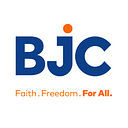Sunday and the 4th of July
By BJC Executive Director Amanda Tyler
For the first time since 2010, July 4 falls on a Sunday. Many churches will be faced with an even stronger temptation than in other years to turn their regular Sunday morning service into a celebration of Independence Day.
To be sure, many churchgoers will also be faced with the dilemma of whether to skip Sunday services altogether in favor of extra time at the lake. Perhaps that is why First Baptist Dallas scheduled its annual “Freedom Sunday’’ a week early this year. The service started with a medley of patriotic songs, followed by congregational singing of the national anthem with a small indoor fireworks show, and then a flag-waving salute to all the branches of the U.S. military. The scale of this service was grand, but it reminded me of smaller celebrations held in all kinds of churches during the summer months, including the “God and Country” dinner the church I grew up in hosted in the fellowship hall every July.
So are these expressions of patriotism in our religious spaces problematic, and if yes, then how so? To answer this question, congregations should consider what message the service or celebration sends about the mission of the church and its service to the community and the world.
The pageantry of a “July 4th Sunday” replaces our communal worship of God with the veneration of Christian nationalism — a political ideology and cultural framework that merges our identities as Americans and Christians. These services can confuse our allegiances to the point of idolatry and twist our theology to make it seem as if Jesus died 2000 years ago to save America, and not the whole world.
Celebrating America in our sanctuaries can also risk turning our patriotism to nationalism. Christians Against Christian Nationalism, a project organized by BJC, explains the distinction this way in the FAQ section:
“Patriotism” is love of country that is expressed in many ways, such as waving an American flag, volunteering at a food bank, teaching in the public schools, serving in the military, running for public office, or protesting policies with which you disagree. “Nationalism” is an extreme form of patriotism that demands a position of superiority and has little or no room for dissent or disagreement.
How can you tell the difference between patriotism and nationalism? Ask yourself: Is my patriotism requiring me to minimize or sacrifice my theological convictions? If so, it’s not patriotism; it’s nationalism. While our faith should certainly inform our political activism, the mission of the church should be apparently distinct from the domestic and foreign policies of the United States. When we align our identities as Americans and Christians to the point that we can tell no difference between the two, we lose the ability to use our religious convictions to critique the actions of the state.
History teaches us the dire results of turning our prophetic witness into a cheerleader for the government. Tragically, both for untold numbers of people who have been killed and oppressed and for American Christianity itself, white Christian nationalism has caused Christians to minimize or abandon altogether tenets of their faith in order to align themselves with political power. Christian scripture was used to justify seizing land from Native Americans and then committing genocide against them, holding kidnapped Africans in slavery, and perpetuating racial terrorism in the form of lynching and Jim Crow segregation.
This 4th of July, we can learn from our past and choose a better way to express our patriotism and our fidelity to Christ — by seeing those as two distinct parts of our identity as American Christians. Let’s worship God on Sunday morning and save the patriotic songs and fireworks for Sunday night.
Amanda Tyler is Executive Director of BJC.
